Report: Analyzing Knowledge Sharing Behavior in Virtual Communities
VerifiedAdded on 2023/06/04
|6
|1325
|139
Report
AI Summary
This report provides a comprehensive analysis of an article titled "Knowledge Sharing Behavior in Virtual Communities." The article investigates the factors that support or hinder knowledge sharing, focusing on personal and environmental perspectives. It proposes a Social Cognitive Theory (SCT)-based model, incorporating self-efficacy, outcome expectations, and multidimensional trusts. The analysis covers the article's purpose, audience, subject, sources, thesis, evidence, limitations, and point of view. The report also examines the presentation and argumentation, including concepts, use of evidence, conclusions, and implications. Furthermore, it evaluates the article, assessing its strengths, weaknesses, and overall quality. The implications discussed include both research and practical applications, such as the use of web-based surveys for faster responses and the application of the SCT model to determine knowledge sharing among employees. The analysis highlights the importance of trust based on identification in knowledge-sharing behavior within virtual communities, where members share common goals.
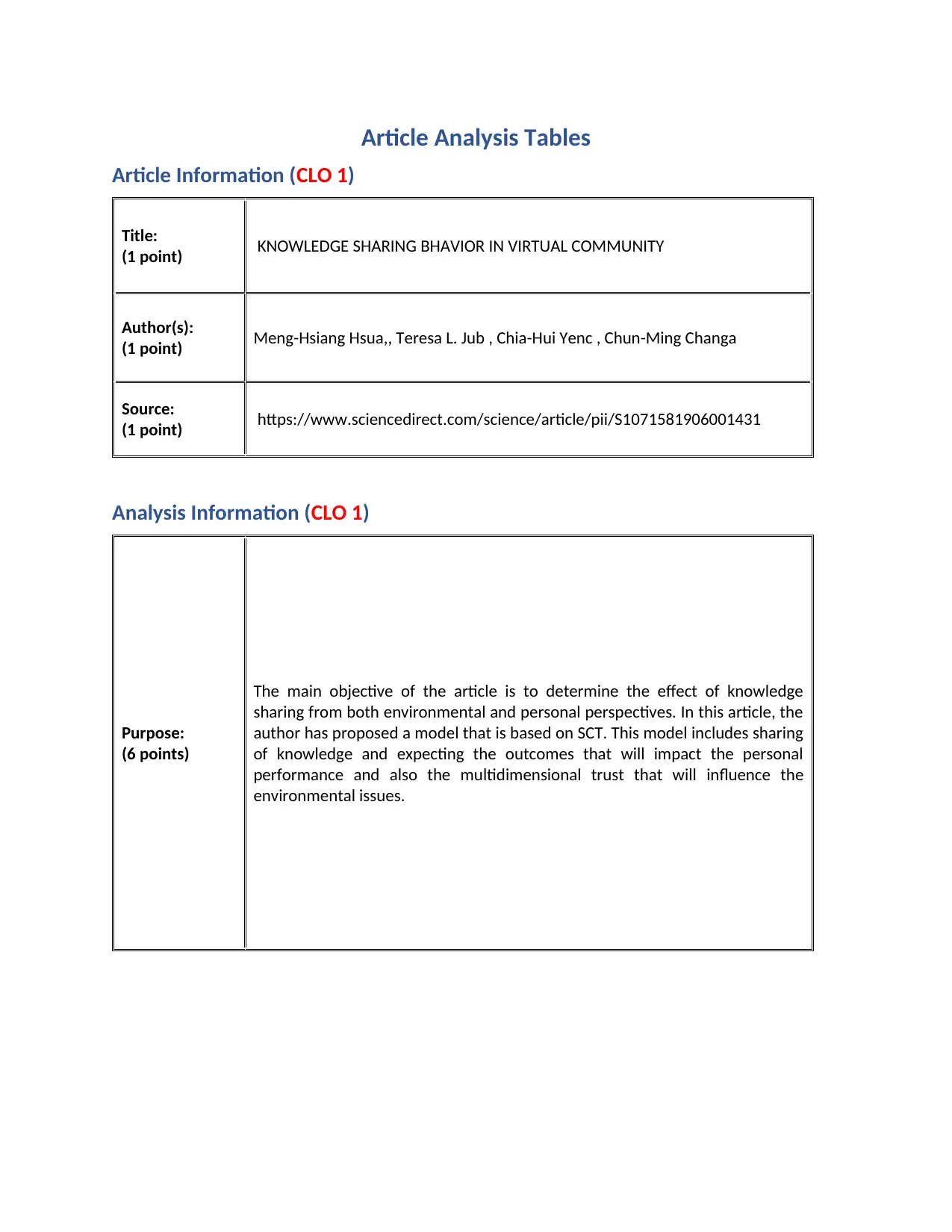
Article Analysis Tables
Article Information (CLO 1)
Title:
(1 point) KNOWLEDGE SHARING BHAVIOR IN VIRTUAL COMMUNITY
Author(s):
(1 point) Meng-Hsiang Hsua,, Teresa L. Jub , Chia-Hui Yenc , Chun-Ming Changa
Source:
(1 point) https://www.sciencedirect.com/science/article/pii/S1071581906001431
Analysis Information (CLO 1)
Purpose:
(6 points)
The main objective of the article is to determine the effect of knowledge
sharing from both environmental and personal perspectives. In this article, the
author has proposed a model that is based on SCT. This model includes sharing
of knowledge and expecting the outcomes that will impact the personal
performance and also the multidimensional trust that will influence the
environmental issues.
Article Information (CLO 1)
Title:
(1 point) KNOWLEDGE SHARING BHAVIOR IN VIRTUAL COMMUNITY
Author(s):
(1 point) Meng-Hsiang Hsua,, Teresa L. Jub , Chia-Hui Yenc , Chun-Ming Changa
Source:
(1 point) https://www.sciencedirect.com/science/article/pii/S1071581906001431
Analysis Information (CLO 1)
Purpose:
(6 points)
The main objective of the article is to determine the effect of knowledge
sharing from both environmental and personal perspectives. In this article, the
author has proposed a model that is based on SCT. This model includes sharing
of knowledge and expecting the outcomes that will impact the personal
performance and also the multidimensional trust that will influence the
environmental issues.
Paraphrase This Document
Need a fresh take? Get an instant paraphrase of this document with our AI Paraphraser
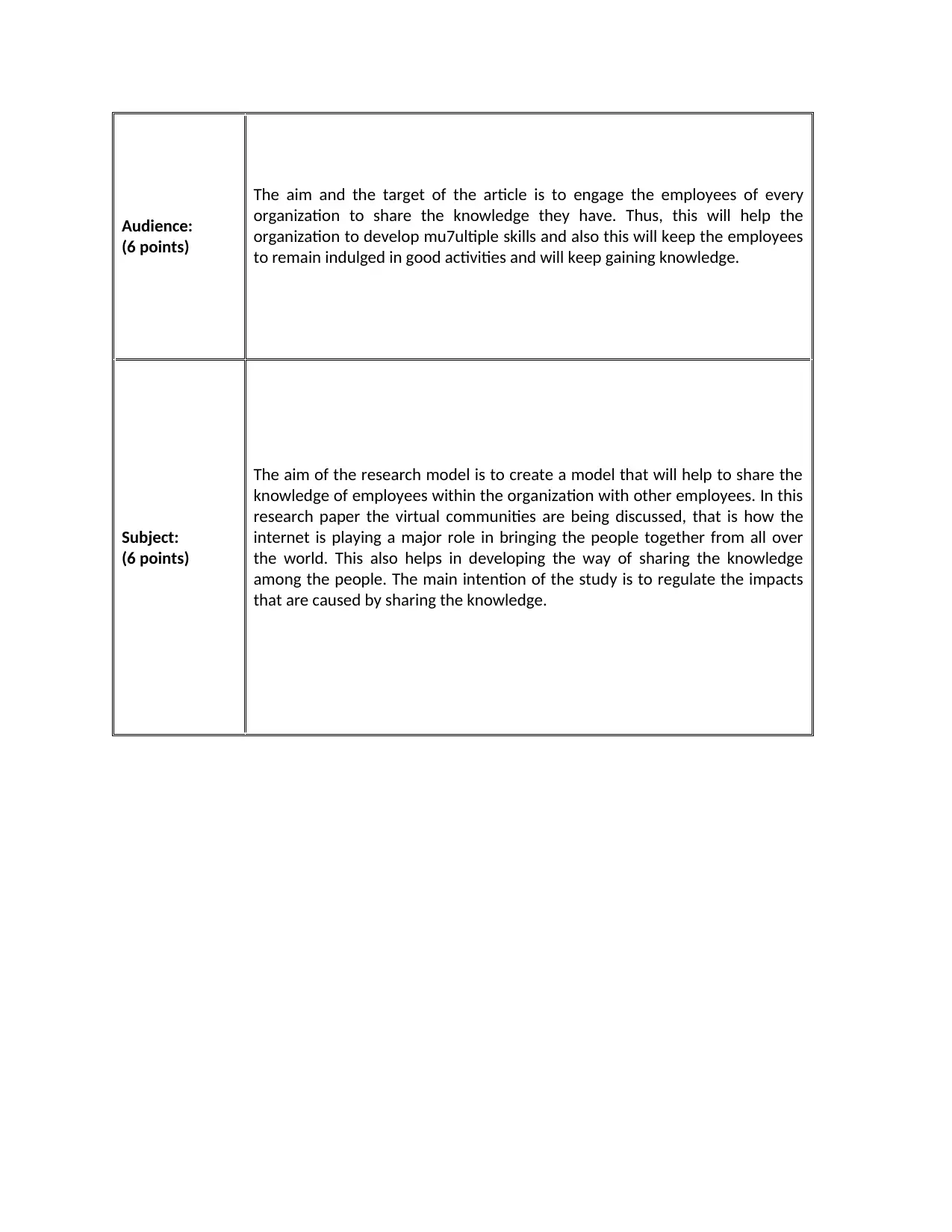
Audience:
(6 points)
The aim and the target of the article is to engage the employees of every
organization to share the knowledge they have. Thus, this will help the
organization to develop mu7ultiple skills and also this will keep the employees
to remain indulged in good activities and will keep gaining knowledge.
Subject:
(6 points)
The aim of the research model is to create a model that will help to share the
knowledge of employees within the organization with other employees. In this
research paper the virtual communities are being discussed, that is how the
internet is playing a major role in bringing the people together from all over
the world. This also helps in developing the way of sharing the knowledge
among the people. The main intention of the study is to regulate the impacts
that are caused by sharing the knowledge.
(6 points)
The aim and the target of the article is to engage the employees of every
organization to share the knowledge they have. Thus, this will help the
organization to develop mu7ultiple skills and also this will keep the employees
to remain indulged in good activities and will keep gaining knowledge.
Subject:
(6 points)
The aim of the research model is to create a model that will help to share the
knowledge of employees within the organization with other employees. In this
research paper the virtual communities are being discussed, that is how the
internet is playing a major role in bringing the people together from all over
the world. This also helps in developing the way of sharing the knowledge
among the people. The main intention of the study is to regulate the impacts
that are caused by sharing the knowledge.
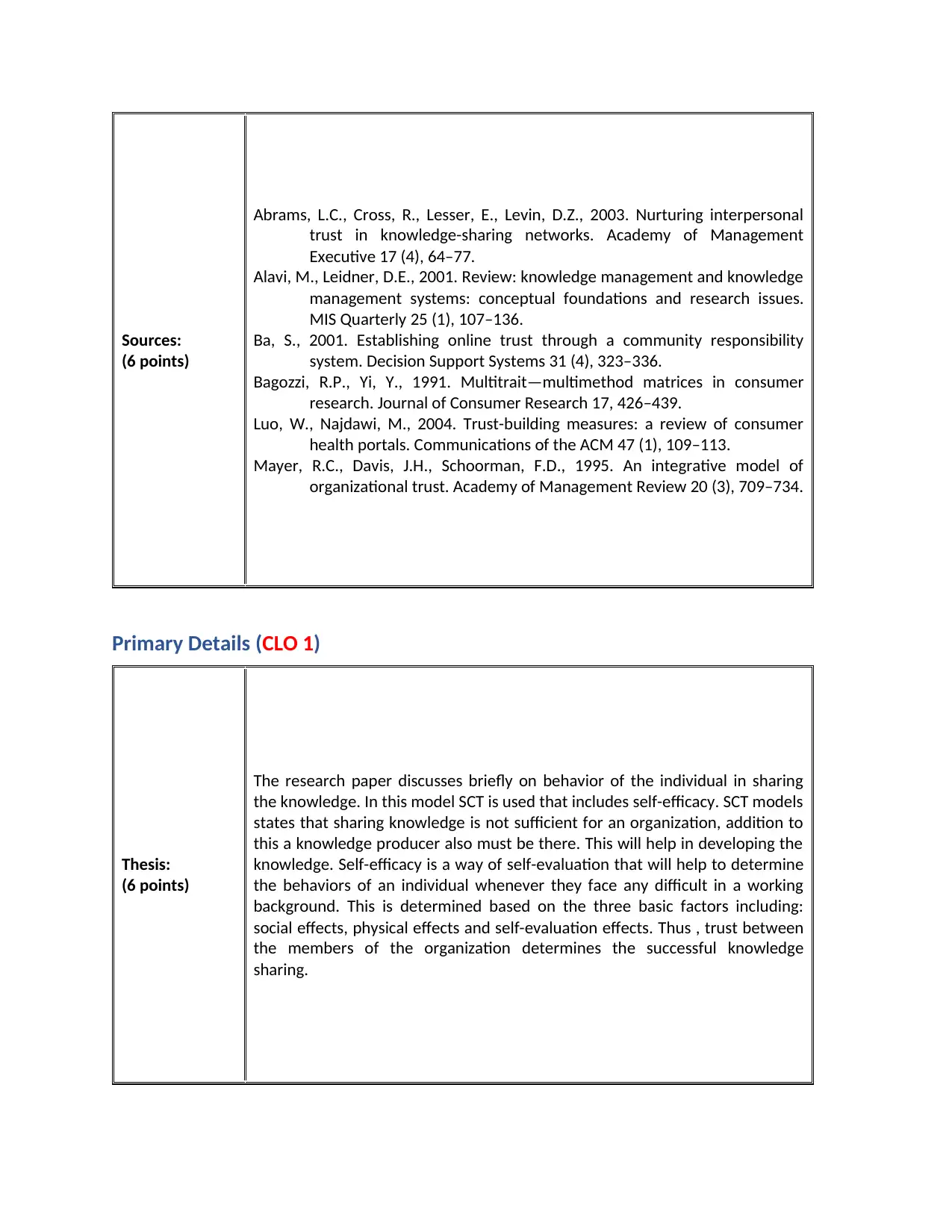
Sources:
(6 points)
Abrams, L.C., Cross, R., Lesser, E., Levin, D.Z., 2003. Nurturing interpersonal
trust in knowledge-sharing networks. Academy of Management
Executive 17 (4), 64–77.
Alavi, M., Leidner, D.E., 2001. Review: knowledge management and knowledge
management systems: conceptual foundations and research issues.
MIS Quarterly 25 (1), 107–136.
Ba, S., 2001. Establishing online trust through a community responsibility
system. Decision Support Systems 31 (4), 323–336.
Bagozzi, R.P., Yi, Y., 1991. Multitrait—multimethod matrices in consumer
research. Journal of Consumer Research 17, 426–439.
Luo, W., Najdawi, M., 2004. Trust-building measures: a review of consumer
health portals. Communications of the ACM 47 (1), 109–113.
Mayer, R.C., Davis, J.H., Schoorman, F.D., 1995. An integrative model of
organizational trust. Academy of Management Review 20 (3), 709–734.
Primary Details (CLO 1)
Thesis:
(6 points)
The research paper discusses briefly on behavior of the individual in sharing
the knowledge. In this model SCT is used that includes self-efficacy. SCT models
states that sharing knowledge is not sufficient for an organization, addition to
this a knowledge producer also must be there. This will help in developing the
knowledge. Self-efficacy is a way of self-evaluation that will help to determine
the behaviors of an individual whenever they face any difficult in a working
background. This is determined based on the three basic factors including:
social effects, physical effects and self-evaluation effects. Thus , trust between
the members of the organization determines the successful knowledge
sharing.
(6 points)
Abrams, L.C., Cross, R., Lesser, E., Levin, D.Z., 2003. Nurturing interpersonal
trust in knowledge-sharing networks. Academy of Management
Executive 17 (4), 64–77.
Alavi, M., Leidner, D.E., 2001. Review: knowledge management and knowledge
management systems: conceptual foundations and research issues.
MIS Quarterly 25 (1), 107–136.
Ba, S., 2001. Establishing online trust through a community responsibility
system. Decision Support Systems 31 (4), 323–336.
Bagozzi, R.P., Yi, Y., 1991. Multitrait—multimethod matrices in consumer
research. Journal of Consumer Research 17, 426–439.
Luo, W., Najdawi, M., 2004. Trust-building measures: a review of consumer
health portals. Communications of the ACM 47 (1), 109–113.
Mayer, R.C., Davis, J.H., Schoorman, F.D., 1995. An integrative model of
organizational trust. Academy of Management Review 20 (3), 709–734.
Primary Details (CLO 1)
Thesis:
(6 points)
The research paper discusses briefly on behavior of the individual in sharing
the knowledge. In this model SCT is used that includes self-efficacy. SCT models
states that sharing knowledge is not sufficient for an organization, addition to
this a knowledge producer also must be there. This will help in developing the
knowledge. Self-efficacy is a way of self-evaluation that will help to determine
the behaviors of an individual whenever they face any difficult in a working
background. This is determined based on the three basic factors including:
social effects, physical effects and self-evaluation effects. Thus , trust between
the members of the organization determines the successful knowledge
sharing.
⊘ This is a preview!⊘
Do you want full access?
Subscribe today to unlock all pages.

Trusted by 1+ million students worldwide
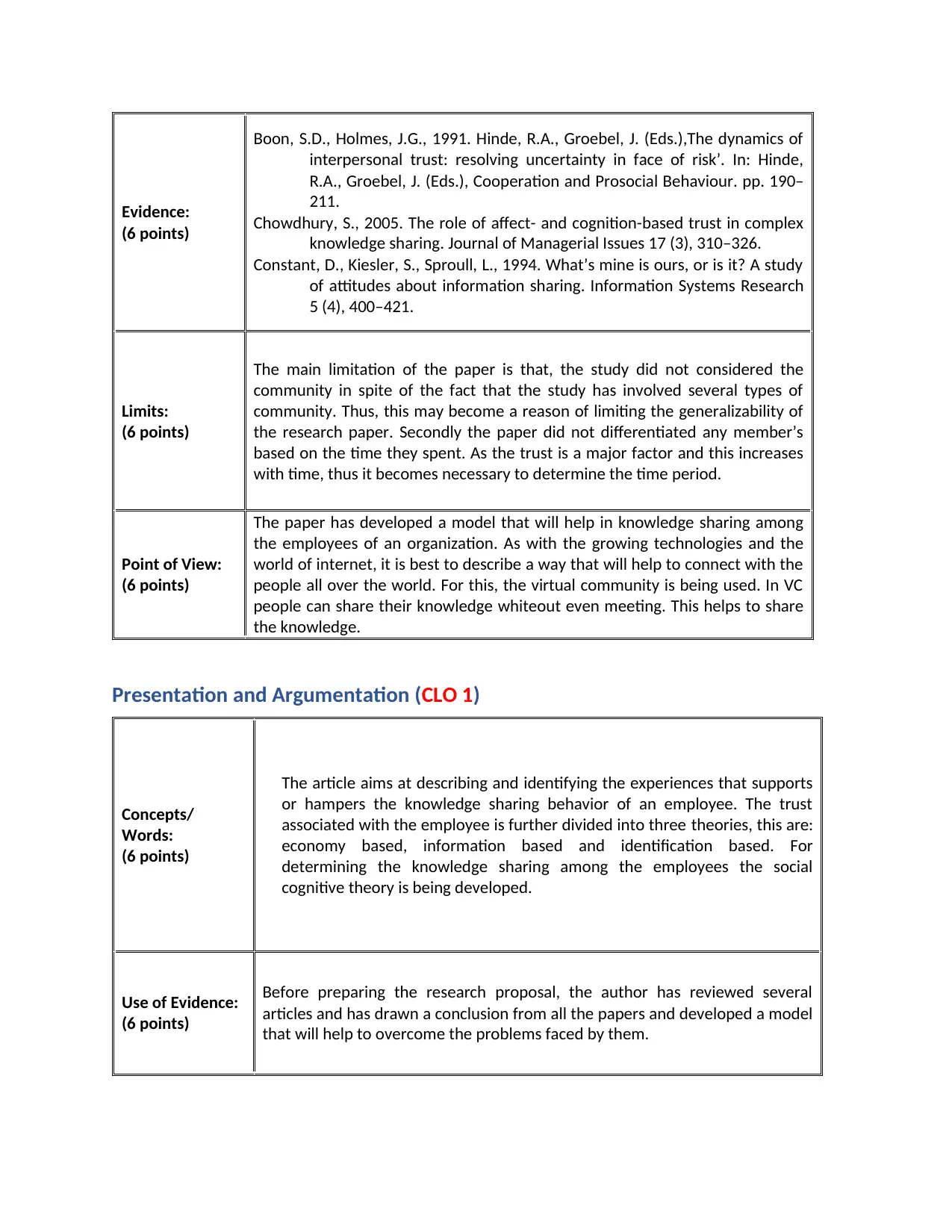
Evidence:
(6 points)
Boon, S.D., Holmes, J.G., 1991. Hinde, R.A., Groebel, J. (Eds.),The dynamics of
interpersonal trust: resolving uncertainty in face of risk’. In: Hinde,
R.A., Groebel, J. (Eds.), Cooperation and Prosocial Behaviour. pp. 190–
211.
Chowdhury, S., 2005. The role of affect- and cognition-based trust in complex
knowledge sharing. Journal of Managerial Issues 17 (3), 310–326.
Constant, D., Kiesler, S., Sproull, L., 1994. What’s mine is ours, or is it? A study
of attitudes about information sharing. Information Systems Research
5 (4), 400–421.
Limits:
(6 points)
The main limitation of the paper is that, the study did not considered the
community in spite of the fact that the study has involved several types of
community. Thus, this may become a reason of limiting the generalizability of
the research paper. Secondly the paper did not differentiated any member’s
based on the time they spent. As the trust is a major factor and this increases
with time, thus it becomes necessary to determine the time period.
Point of View:
(6 points)
The paper has developed a model that will help in knowledge sharing among
the employees of an organization. As with the growing technologies and the
world of internet, it is best to describe a way that will help to connect with the
people all over the world. For this, the virtual community is being used. In VC
people can share their knowledge whiteout even meeting. This helps to share
the knowledge.
Presentation and Argumentation (CLO 1)
Concepts/
Words:
(6 points)
The article aims at describing and identifying the experiences that supports
or hampers the knowledge sharing behavior of an employee. The trust
associated with the employee is further divided into three theories, this are:
economy based, information based and identification based. For
determining the knowledge sharing among the employees the social
cognitive theory is being developed.
Use of Evidence:
(6 points)
Before preparing the research proposal, the author has reviewed several
articles and has drawn a conclusion from all the papers and developed a model
that will help to overcome the problems faced by them.
(6 points)
Boon, S.D., Holmes, J.G., 1991. Hinde, R.A., Groebel, J. (Eds.),The dynamics of
interpersonal trust: resolving uncertainty in face of risk’. In: Hinde,
R.A., Groebel, J. (Eds.), Cooperation and Prosocial Behaviour. pp. 190–
211.
Chowdhury, S., 2005. The role of affect- and cognition-based trust in complex
knowledge sharing. Journal of Managerial Issues 17 (3), 310–326.
Constant, D., Kiesler, S., Sproull, L., 1994. What’s mine is ours, or is it? A study
of attitudes about information sharing. Information Systems Research
5 (4), 400–421.
Limits:
(6 points)
The main limitation of the paper is that, the study did not considered the
community in spite of the fact that the study has involved several types of
community. Thus, this may become a reason of limiting the generalizability of
the research paper. Secondly the paper did not differentiated any member’s
based on the time they spent. As the trust is a major factor and this increases
with time, thus it becomes necessary to determine the time period.
Point of View:
(6 points)
The paper has developed a model that will help in knowledge sharing among
the employees of an organization. As with the growing technologies and the
world of internet, it is best to describe a way that will help to connect with the
people all over the world. For this, the virtual community is being used. In VC
people can share their knowledge whiteout even meeting. This helps to share
the knowledge.
Presentation and Argumentation (CLO 1)
Concepts/
Words:
(6 points)
The article aims at describing and identifying the experiences that supports
or hampers the knowledge sharing behavior of an employee. The trust
associated with the employee is further divided into three theories, this are:
economy based, information based and identification based. For
determining the knowledge sharing among the employees the social
cognitive theory is being developed.
Use of Evidence:
(6 points)
Before preparing the research proposal, the author has reviewed several
articles and has drawn a conclusion from all the papers and developed a model
that will help to overcome the problems faced by them.
Paraphrase This Document
Need a fresh take? Get an instant paraphrase of this document with our AI Paraphraser
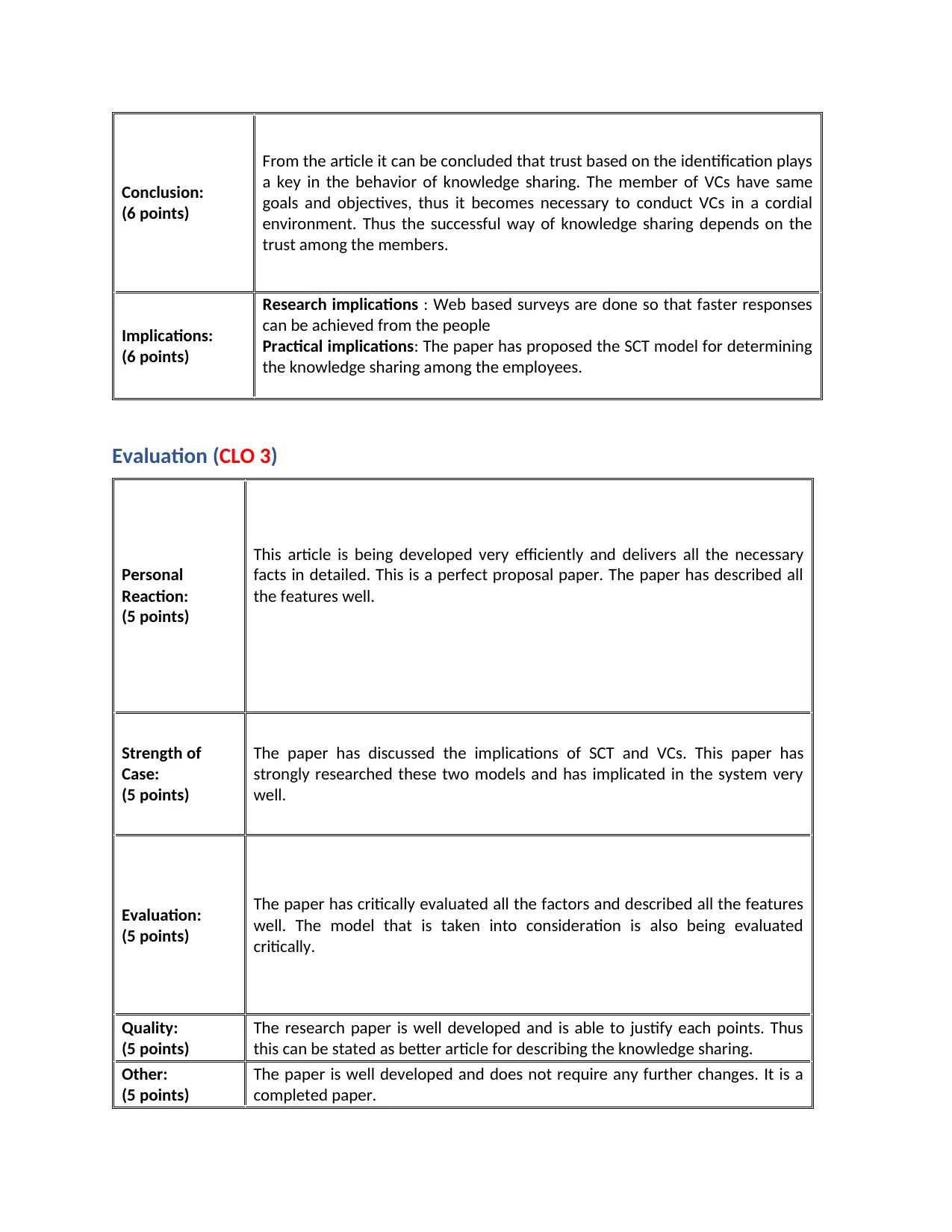
Conclusion:
(6 points)
From the article it can be concluded that trust based on the identification plays
a key in the behavior of knowledge sharing. The member of VCs have same
goals and objectives, thus it becomes necessary to conduct VCs in a cordial
environment. Thus the successful way of knowledge sharing depends on the
trust among the members.
Implications:
(6 points)
Research implications : Web based surveys are done so that faster responses
can be achieved from the people
Practical implications: The paper has proposed the SCT model for determining
the knowledge sharing among the employees.
Evaluation (CLO 3)
Personal
Reaction:
(5 points)
This article is being developed very efficiently and delivers all the necessary
facts in detailed. This is a perfect proposal paper. The paper has described all
the features well.
Strength of
Case:
(5 points)
The paper has discussed the implications of SCT and VCs. This paper has
strongly researched these two models and has implicated in the system very
well.
Evaluation:
(5 points)
The paper has critically evaluated all the factors and described all the features
well. The model that is taken into consideration is also being evaluated
critically.
Quality:
(5 points)
The research paper is well developed and is able to justify each points. Thus
this can be stated as better article for describing the knowledge sharing.
Other:
(5 points)
The paper is well developed and does not require any further changes. It is a
completed paper.
(6 points)
From the article it can be concluded that trust based on the identification plays
a key in the behavior of knowledge sharing. The member of VCs have same
goals and objectives, thus it becomes necessary to conduct VCs in a cordial
environment. Thus the successful way of knowledge sharing depends on the
trust among the members.
Implications:
(6 points)
Research implications : Web based surveys are done so that faster responses
can be achieved from the people
Practical implications: The paper has proposed the SCT model for determining
the knowledge sharing among the employees.
Evaluation (CLO 3)
Personal
Reaction:
(5 points)
This article is being developed very efficiently and delivers all the necessary
facts in detailed. This is a perfect proposal paper. The paper has described all
the features well.
Strength of
Case:
(5 points)
The paper has discussed the implications of SCT and VCs. This paper has
strongly researched these two models and has implicated in the system very
well.
Evaluation:
(5 points)
The paper has critically evaluated all the factors and described all the features
well. The model that is taken into consideration is also being evaluated
critically.
Quality:
(5 points)
The research paper is well developed and is able to justify each points. Thus
this can be stated as better article for describing the knowledge sharing.
Other:
(5 points)
The paper is well developed and does not require any further changes. It is a
completed paper.

⊘ This is a preview!⊘
Do you want full access?
Subscribe today to unlock all pages.

Trusted by 1+ million students worldwide
1 out of 6
Related Documents
Your All-in-One AI-Powered Toolkit for Academic Success.
+13062052269
info@desklib.com
Available 24*7 on WhatsApp / Email
![[object Object]](/_next/static/media/star-bottom.7253800d.svg)
Unlock your academic potential
Copyright © 2020–2026 A2Z Services. All Rights Reserved. Developed and managed by ZUCOL.





